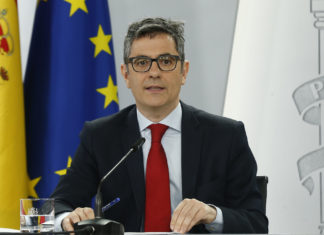Cartagena
July 28
Attitudinising as a skilled law expert Mr David Burrage scrutinised the opinions on Spain’s infringement of the Double Taxation Convention (DTC) with the UK, recently expressed by correspondents on CBN’s Letters page.
My relevant contribution (July 19 – 25, 2019), based on citations of CJEU (Court of Justice of the EU) precedents, the existing practice resulting from my personal dealings with EU institutions, as well as a 33-year-long Spain experience, was met by Mr Burrage’s lack of legal professionalism, obviously failing knowledge about the functioning of the Spanish judiciary. Mr Burrage revealed his unqualified allegations on page 47, 2nd column, 3rd paragraph as follows:
‘Mr Weissmann … not offering specifically related case law of the CJEU.’
Wrong! The truth is that CJEU precedents regarding DTC violations are inexistent.
‘Due to breach of Community law to bring the matter before the CJEU.’
Wrong! In my letter – below the heading II. DG TAXUD – I stated that I’d start the free pre-litigation procedure laid down in Article 258 TFEU (Treaty on the Functioning of the EU) . . . i.e. to allow Spain, amicably, to put an end to the infringement of the DTC without bringing an action before the CJEU.
Although Article 25 (1) DTC contains a ‘Mutual Agreement Procedure’ to nationally resolve discrepancies, this norm is prevailed by Article 18 TFEU: ‘The EU Parliament and Council have adopted rules prohibiting discrimination on the grounds of nationality and residence.’
In this context a petition addressed to DG TAXUD, to start pre-litigation procedures against Spain, should be corroborated by substantial evidence that national courts are part of a politicalised judiciary; for example: The CJEU sentence no C – 127/12, mentioned in my letter to the editor, reveals how the judges ripped apart the Finance Ministry’s moronic justification to charge non-residents a 20% higher gift & succession tax as compared to residents and that this discriminatory violation of Article 18 TFEU has never been abolished by Spanish courts in previous trials.
In addition, the lack of any impartiality of Spanish courts lies in the fact that they abstained from requesting a preliminary opinion pursuant to Article 267 TFEU from the CJEU, compulsory in a trial whose sentence is not subject to an appeal or other type of redress.
Therefore, the Luxembourg CJEU judges, sarcastically, commented on page 14, paragraph 83 of their sentence: ‘Although the Kingdom of Spain favours the objective to guarantee an efficient fiscal control and combat tax evasion, this especially shows proof that the absence of a mutual information exchange could justify legislation subject to the current litigation.’
The CJEU Judges reminded Spain on the sentence’s page 12, paragraph 67: ‘The measure prohibited according to Article 67 TFEU, to create restrictions of the movement of capital, include especially those which could prevent non-residents from realising investments in a Member State or maintain such investments (HALLEY C – 132/10).’
What Mr Burrage fails to understand is that the tax grab case has to be taken out of the ‘vicious circle’, i.e. the Spanish manifestly partial, politicalised judiciary.
If a group of tax grab victims, individually, ‘Tsunami-like’, file with DG TAXUD their requests for a start of the pre-litigation procedure, copies to be sent to newly-elected EU Commission president Ursula von der Leyen, in order ‘to make noise’. Later obtain UK media support, titling: ‘Expats in Spain feel fear, the tax grab bogeyman is here’.
Mr Burrage tells of tax grab victims dismayed by the high legal fees of lawyers he has contacted and the advice ‘no class action suit can be considered . . . no two persons’ circumstances will be the same.’ To me it reeks suspiciously, considering that all tax grab victims suffer from the discrimination of nationality and residence, prohibited pursuant to Article 18 TFEU.
Best regards,
Wilfried Weissmann
We passed your letter to Mr Burrage and here is his reply….
Thank you for allowing me to respond to Wilfred Weissmann’s expected contradiction to that which was published in your ‘Letters page’ of the 26 July – 01 August edition under my signature.
I was expecting the usual argumentative response and for that reason I had previously stated that I have no wish to become embroiled in unseemly exchanges with Mr Weismann, as I have neither the time nor the inclination, other than again stating, that where a conflict has arisen, such as in the present matter of a bilateral treaty between, the UK and Spain, namely The Double Taxation Convention 2013, which entered into force on 12 June 2014, and where provisions are made for the purposes of resolving disputes, namely as set at in its Article 25
Article 25 Mutual Agreement Procedure
1. Where a person considers that the actions of one or both of the Contracting States result or will result for him in taxation not in accordance with the provisions of this Convention, he may, irrespective of the remedies provided by the domestic law of those States, present his case to the competent authority of the Contracting State of which he is a resident or, if his case comes under paragraph 1 of Article 24, to that of the Contracting State of which he is a national. The case must be presented within three years from the first notification of the action resulting in taxation not in accordance with the provisions of the Convention. (My emphasis added).
Should there be no resolve under the procedures set out in the Convention, then the correct course to follow is to continue to attempt to seek a resolve at domestic level, if necessary through the domestic Courts.
I am bound to say that I found the content of Mr Weissman’s recent response to be somewhat erratic and clearly written in a moment of anger. For example Mr Weissman in his earlier letter, refers his advice being that his first course of action would be to follow the route laid down in Article 258 of the Treaty which sets out the infringement procedure before a Member State may be brought before the CJEU for failing to rectify their alleged infraction
Article 258 of the Treaty on the Functioning of the European Union (TFEU)
(ex Article 226 of the Treaty establishing the European Community – TEC)
If the Commission considers that a Member State has failed to fulfil an obligation under the Treaties, it shall deliver a reasoned opinion on the matter after giving the State concerned the opportunity to submit its observations.
If the State concerned does not comply with the opinion within the period laid down by the Commission, the latter may bring the matter before the Court of Justice of the European Union.
Let me advise Mr Weissmann that complainants must first exhaust the remedies in the State where the alleged infringement occurred/is occurring, or in the case of the present matter, also with HMRC where a British national considers that Spain is responsible for violating the Convention. This is because Article 25 also places the responsibility for investigating the alleged infraction on the national State of which the complaint is a national, even though the alleged infraction involves his state of residence.
Mr Weissmann also waffled on by referring to case law of the CJEU where clearly he has little or no understanding of Community law. Indeed such law can readily be found by merely using ones search engine.
Understanding it is entirely another matter. In that same response, Mr Weissmann also referred to Article 267 of the Treaty. Even here, he was muddled because this article relates to where the CJEU may be requested to give a ‘Preliminary Ruling’ in any matter of Community law over which it has jurisdiction. Usually this is affected by a request from the Commission or any lawful Tribunal of each of the Member States. Indeed, such a Tribunal of Final Instance, where a complainant is locked out from pursuing his complaint further at national level, including where he is refused leave to appeal, then that Tribunal is obliged to send the matter to the CJEU.
There are provisions whereby an individual can also seek such a ruling, but that is rare and a very difficult route to follow. Therefore, when viewed in proper context of the law and the procedures laid down relating to the law, clearly all reasonable avenues to resolve such disputes must first be pursued at domestic level.
Readers will also recall that not only in his present response, but also in his earlier letter, he launched off in an attack against the Spanish judicial system. Such remarks, when made on a general basis, merely reveal that the person making them is unworthy of notice and should be disregarded.
In his final paragraph, Mr Weissmen refers to my telling of those affected in this matter and I quote. “Mr Burrage… tells of tax grab victims dismayed by the high legal fees of lawyers he has contacted etc., etc.,” Under normal circumstances, I would put him on notice of proof that I made such a statement.
My observation was to the effect that the first question asked was one of how much would it cost in lawyers’ fees. This has a distinctly separate meaning to that Mr Weissmann falsely alleges I made. Indeed the firm of Lawyers with whom I had meetings in Alicante had offered to defend the rights of those affected by charging a small amount of money up front to cover their initial costs and then they would charge ‘pro bono’ (No win no fee).
The Editor of this newspaper has been sent a copy of that second legal reasoned opinion of the above referred to lawyers, who fully agree my own opinion.
Ironically, Mr Weissman also seeks to rely on publications in this newspaper under the pen of Dave Jones, whereas Mr Jones’s articles on the subject are mainly based on the fact he had consulted me following my raising the issue. This is an appropriate juncture to thank the Editor and Mr Jones for their fullest support and cooperation in this matter.
As a parting note I would advise readers to ignore Mr Weissmann who has declared that he has no personal interest in this matter and his interference not only leaves himself open to ridicule for his foolishness. He reveals himself to be an argumentative, self-opinionated and destructive individual, who, left to his own devices would lead readers astray.
I will always give way to those more knowledgeable than myself, but Mr Weissmann has revealed to me that he is not such a person.
For the record, I will enter into no further exchanges with this individual because I prefer to direct my energy in helping others.
David R. Burrage








































